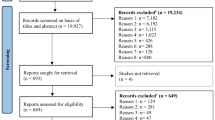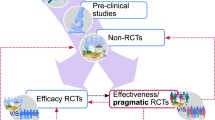Abstract
Background/Objective:
To assess the conclusiveness of the Cochrane Reviews (CRs) in the field of Nutrition, we tested the hypotheses that: (1) the majority of CRs is inconclusive; (2) the majority of CRs recognizes the need for further and better studies and (3) the ability to reach a conclusion is dependent on the number of studies performed and number of patients enrolled.
Subjects/Methods:
We selected all 87 CRs in the field of Nutrition available in Cochrane library. Each CR was analyzed for the number of randomized clinical trials (RCTs) found, number of RCTs included for analysis, number of patients enrolled, the stated need for further studies and the reason(s) for it and the conclusiveness of the CR.
Results:
Fifty-six out of eighty-seven CRs (64.4%) were conclusive. The average number of available articles, the percentage of articles included, the average number of RCT’s retained in the analyses and the total cumulative number of patients enrolled in the studies retained for analysis were significantly higher in conclusive CRs than in non-conclusive ones. The majority of inconclusive CRs (70.9%) recognized the need for further studies, a percentage not significantly different from that found in conclusive ones (58.9%, P=0.26). The percentage of conclusive CRs was not affected by year of publication.
Conclusions:
The majority of CRs in Nutrition is conclusive, but most of them emphasize the need for further studies. The ability for a CR to reach a conclusion is affected by the cumulative patient sample size and number of RCT’s included in the analysis.
This is a preview of subscription content, access via your institution
Access options
Subscribe to this journal
Receive 12 print issues and online access
$259.00 per year
only $21.58 per issue
Buy this article
- Purchase on Springer Link
- Instant access to full article PDF
Prices may be subject to local taxes which are calculated during checkout
Similar content being viewed by others
References
Mandel D, Littner Y, Mimouni FB, Lubetzky R . Conclusiveness of the Cochrane Neonatal Reviews: a systematic analysis. Acta Paediatr 2006; 95: 1209–1212.
Egger M, Davey Smith G, Schneider M, Minder C . Bias in meta-analysis detected by a simple, graphical test. BMJ 1997; 315: 629–634.
Sterne JA, Gavaghan D, Egger M . Publication and related bias in meta-analysis: power of statistical tests and prevalence in the literature. J Clin Epidemiol 2000; 53: 1119–1129.
Littner Y, Mimouni FB, Dollberg S, Mandel D . Negative results and impact factor: a lesson from neonatology. Arch Pediatr Adolesc Med 2005; 159: 1036–1037.
Egger M, Zellweger-Zahner T, Schneider M, Junker C, Lengeler C, Antes G . Language bias in randomised controlled trials published in English and German. Lancet 1997; 350: 326–329.
Author information
Authors and Affiliations
Corresponding author
Ethics declarations
Competing interests
The authors declare no conflict of interest.
Rights and permissions
About this article
Cite this article
Cohen, S., Mandel, D., Mimouni, F. et al. Conclusiveness of the Cochrane Reviews in Nutrition: a systematic analysis. Eur J Clin Nutr 68, 143–145 (2014). https://doi.org/10.1038/ejcn.2013.252
Received:
Revised:
Accepted:
Published:
Issue Date:
DOI: https://doi.org/10.1038/ejcn.2013.252
Keywords
This article is cited by
-
How can clinicians choose between conflicting and discordant systematic reviews? A replication study of the Jadad algorithm
BMC Medical Research Methodology (2022)
-
Conclusiveness, linguistic characteristics and readability of Cochrane plain language summaries of intervention reviews: a cross-sectional study
BMC Medical Research Methodology (2022)
-
Conclusiveness of the Cochrane Eye and Vision Group Reviews
BMC Research Notes (2015)



